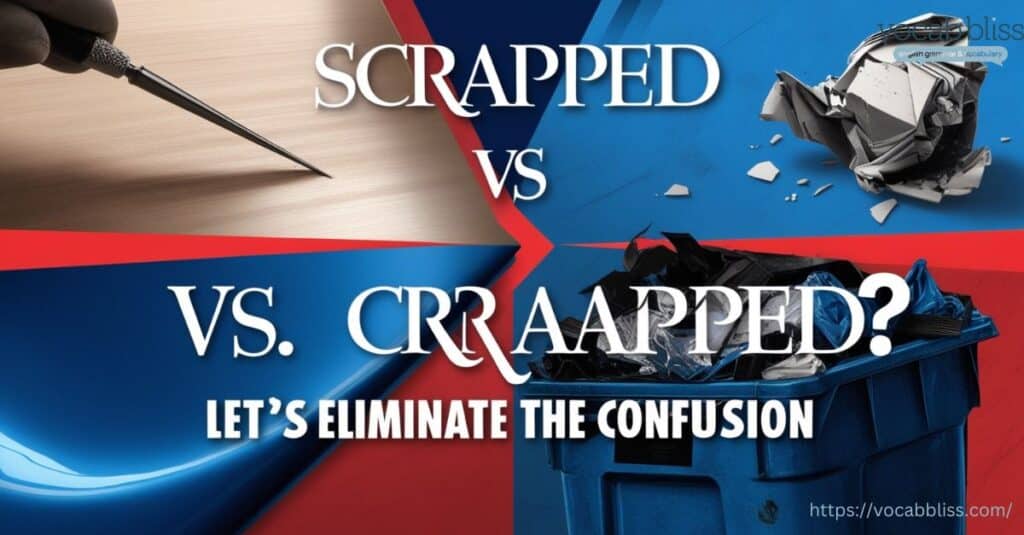Language is full of words that sound similar but mean vastly different things. “Scraped vs Scrapped” are prime examples, often causing confusion due to their near-identical pronunciation and spelling. While these words share some historical roots, their meanings and contexts are worlds apart. In this guide, we’ll explore the differences between scrapped and scraped, their correct usage, examples, origins, and much more to help you never mix them up again.
Quick Summary
The words “scrapped vs scraped” may sound similar, but they carry distinct meanings and uses. “Scrapped” refers to discarding, canceling, or abandoning something, often related to projects, plans, or physical objects no longer needed. In contrast, “scraped” involves rubbing, removing, or barely achieving something, commonly used in physical or metaphorical contexts. Their historical origins stem from Old English and Norse, with “scrapped” evolving from fragments or waste and “scraped” rooted in physical actions of scratching or smoothing. Understanding their differences, origins, and usage ensures precise communication and avoids common confusions.
Continue reading: Connecter or Connector: What’s the Correct Spelling?
Why Is There Confusion Between “Scraped vs Scrapped”?
The confusion between these two words Scraped vs Scrapped arises because they are heterographs—words with different meanings and spellings but similar sounds. Here’s why this mix-up is common:
- Phonetic Similarity: Both words have a “scrap-” root sound, making them easy to confuse in speech.
- Contextual Overlap: They can both describe actions involving objects or decisions, adding to the misunderstanding.
- Usage in Errors: In professional and casual writing, typos or misusage often blur the distinction.
This confusion can lead to miscommunication, especially when clarity is crucial, such as in business or technical writing.
What Does “Scrapped” Mean?
“Scrapped” is the past tense of “scrap” and generally means to discard, abandon, or cancel something. It is often used in contexts where a plan, project, or item is considered no longer useful or necessary.
Examples of “Scrapped” in Context:
- Projects: “The team scrapped the initial design due to budget constraints.”
- Plans: “Our weekend road trip was scrapped because of the storm.”
- Objects: “The old car was scrapped for parts.”
In a figurative sense, it can mean giving up on an idea or effort.

What Does “Scraped” Mean?
“Scraped” is the past tense of “scrape,” referring to an action where something is rubbed, scratched, or removed using friction. It often involves physical surfaces but can also be metaphorical.
Examples of “Scraped” in Context:
- Physical Action: “He scraped the paint off the wall to prepare it for a new coat.”
- Injuries: “She scraped her knee while jogging.”
- Efforts: “They scraped together enough money for the trip.”
The term can also imply barely achieving something: “He scraped by on a limited budget.”
“Scraped vs Scrapped”: Key Differences
Understanding the difference between scrapped vs scraped is essential to avoid errors. Here’s a side-by-side comparison:
| Aspect | Scrapped | Scraped |
|---|---|---|
| Meaning | Discarded, abandoned, or canceled | Rubbed, scratched, or removed |
| Action Type | Decision or action to end something | Physical or metaphorical friction-based action |
| Common Contexts | Plans, projects, objects | Surfaces, injuries, financial struggles |
| Examples | “The proposal was scrapped entirely.” | “The floor was scraped clean of wax.” |
| Figurative Use | Giving up on an idea | Barely managing something |
Which One Should You Use: “Scrapped or Scraped”?
To decide which word to use, consider the context and meaning:
- Use “scrapped” when referring to discarding, abandoning, or canceling something.
- Use “scraped” when talking about removing something via friction or a close, narrow outcome.
If in doubt, substitute synonyms to test:
- “Discarded” fits “scrapped.”
- “Rubbed” aligns with “scraped.”
Examples in Context
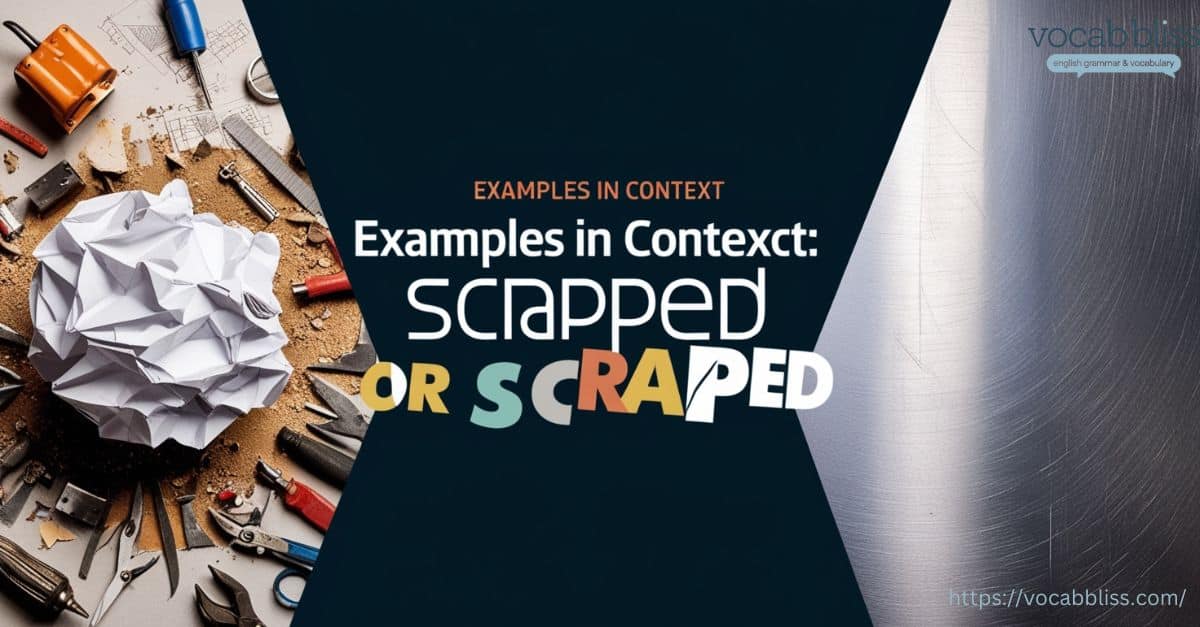
Using “scraped or scrapped” accurately can therefore avoid misunderstandings. For instance, below are examples showcasing each word in real-life contexts.
Examples of “Scrapped”
When referring to plans or projects:
- “The city council scrapped the plan to build a new park due to budget constraints.”
- “Our vacation plans were scrapped because of the flight cancellations.”
When describing objects:
- “The broken-down car was scrapped for parts at the local junkyard.”
- “They scrapped the old computers to upgrade to newer models.”
In a figurative sense:
- “After weeks of trying, she scrapped her initial approach and started fresh.”
- “The writer scrapped the entire first draft of the novel and began again.”
Examples of “Scraped”
When talking about physical actions:
- “He scraped the frost off his windshield before heading to work.”
- “The floor was scraped clean of the old wax before refinishing.”
Injury-related scenarios:
- “She fell off her bike and scraped her elbow on the pavement.”
- “His backpack scraped against the rough wall, leaving a mark.”
Financial or figurative usage:
- “The family scraped together enough money to pay for the repairs.”
- “He barely scraped by on a part-time salary while attending college.”
Narrow successes:
- “The team scraped through to the finals with a last-minute goal.”
- “She scraped a passing grade on the exam after weeks of struggle.”
Comparing Both Words in Sentences
To further highlight the distinction:
- “The outdated policy was scrapped because it no longer aligned with company goals.”
- “He scraped the labels off the jars before reusing them for storage.”
- “Their ambitious project was scrapped after losing investor support.”
- “She scraped her shoes against the doormat to remove the mud.”
These examples demonstrate how the context dictates the choice between “scrapped” and “scraped.” Always consider the intended meaning before using either word!
Scrapping or Scraping
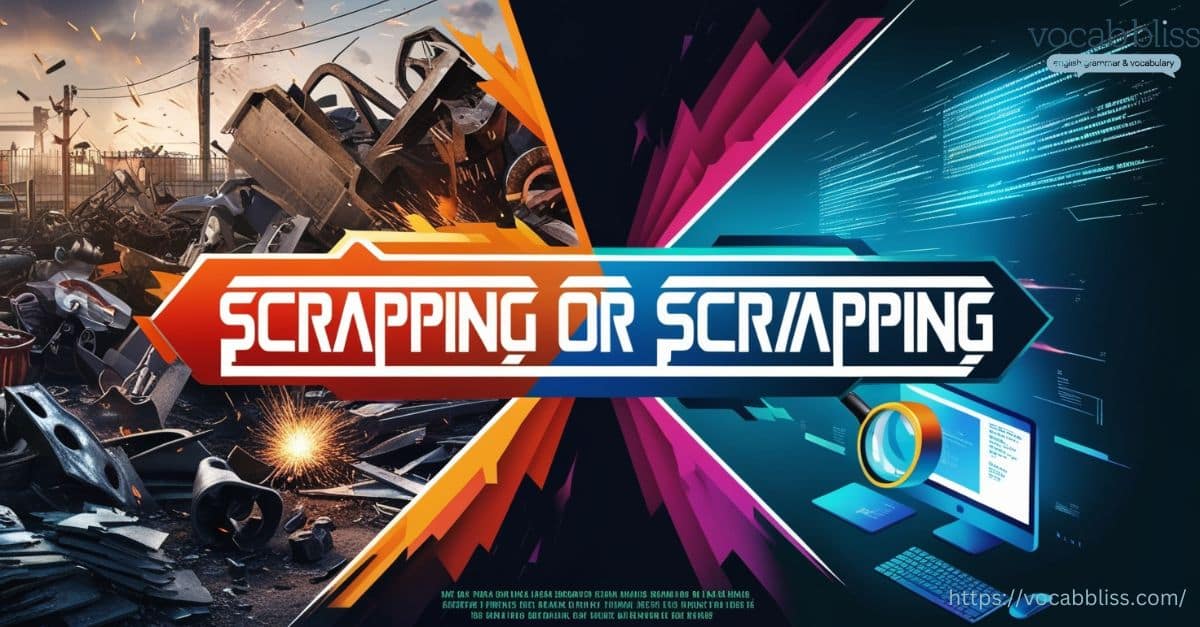
The difference between scrapping or scraping lies in their meanings and contexts. Scrapping refers to discarding, abandoning, or canceling something, such as plans, projects, or materials. For example, “They’re scrapping the old policy to introduce a new one.”
On the other hand, scraping involves rubbing or removing material, or narrowly achieving something. For instance, “She’s scraping paint off the wall” or “He’s scraping by on a tight budget.” While they sound similar, understanding their specific uses helps avoid confusion in writing and speech.
Synonyms for “Scrapped vs Scraped”
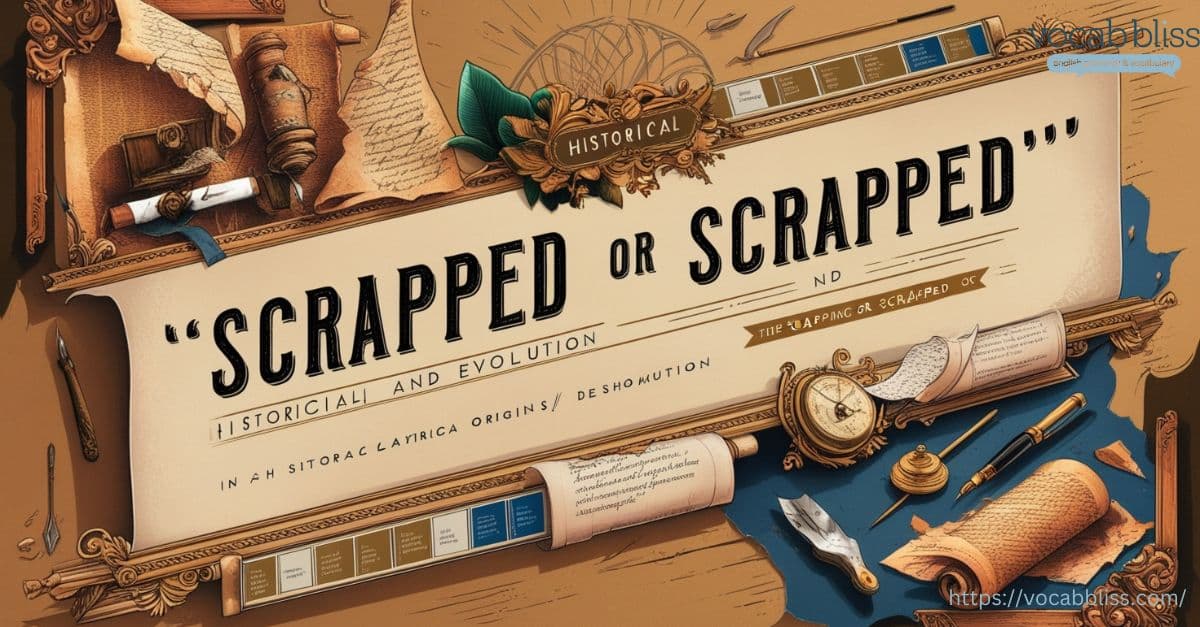
Building a rich vocabulary can help you avoid confusion. Here are some synonyms
Synonyms for “Scrapped”
The word “scrapped” conveys the idea of discarding, canceling, or abandoning something. To elaborate, below are some effective synonyms depending on different contexts:
General Usage:
- Discarded
- Abandoned
- Eliminated
- Dropped
- Canceled
- Terminated
- Jettisoned
- Axed
Project or Plan-Specific:
- Discontinued
- Shelved
- Rejected
- Dismissed
- Nixed
Informal or Colloquial:
- Tossed
- Chucked
- Ditched
Synonyms for “Scraped”
The word “scraped” typically refers to actions involving rubbing, scratching, or removing something. For example, here are its synonyms based on usage:
Physical Actions:
- Grazed
- Rubbed
- Scratched
- Scoured
- Shaved
- Filed
- Smoothed
Figurative or Financial Contexts:
- Gathered
- Raked
- Collected
- Scrounged
- Skimmed
Informal or Casual Usage:
- Scrubbed
- Cleared
- Brushed
These synonyms provide flexibility when writing, allowing you to choose the most precise word for your context.
Historical Origins and Evolution
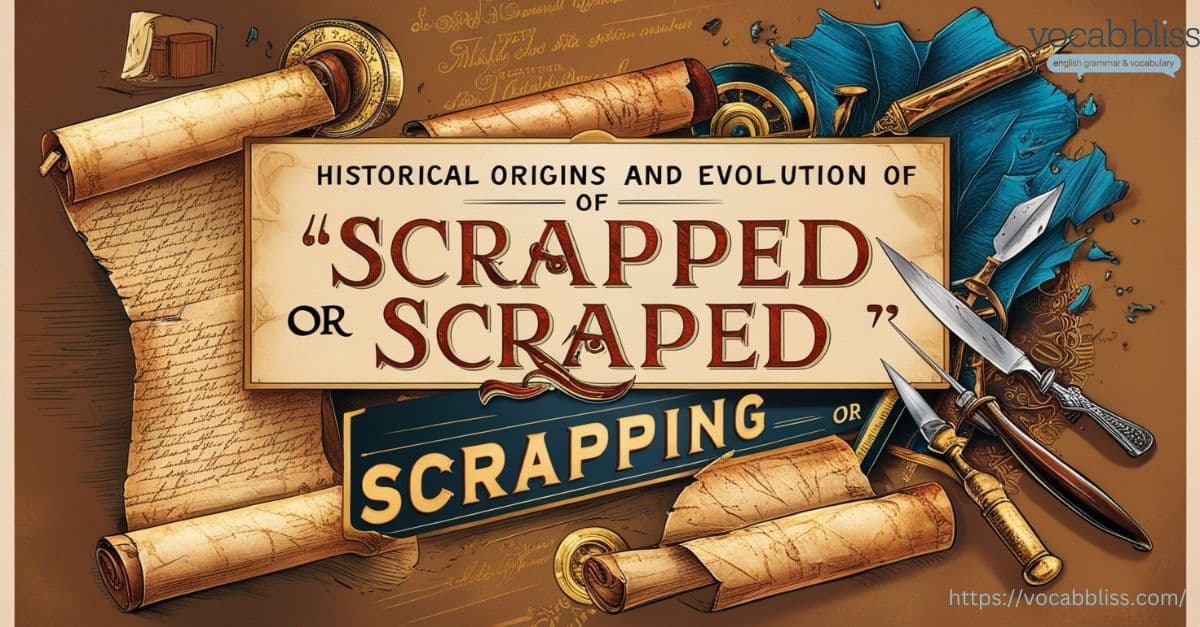
Understanding the etymology and historical evolution of “scrapped or scraped” helps clarify their distinct meanings and uses. Both words stem from rich linguistic roots, tracing back to Old English and Norse influences.
Origins of “Scrapped”
The term “scrapped” is derived from the noun “scrap,” which means a small piece or fragment. Specifically, its roots can be traced to:
- Old Norse: “skrap” – meaning small pieces or fragments, often of discarded material.
- Middle English: “scrappe” – which referred to remnants or leftover pieces.
Over time, the verb “scrap” evolved to mean discarding or abandoning something no longer useful or functional. Specifically, by the 18th century, it was commonly used in contexts such as discarding machinery or terminating plans. Thus, its meaning became more closely tied to the idea of disposal and abandonment.
Historical usage:
- 17th century: Used to describe literal waste materials or metal fragments.
- 19th century: Expanded metaphorically to refer to abandoned plans, ideas, or relationships.
- Modern usage: Commonly applies to projects, policies, or physical objects being canceled or removed.
Example:
- The phrase “scrap metal” highlights its literal origin of discarding small fragments of metal.
Origins of “Scraped”
The term “scraped” is rooted in physical actions of rubbing or smoothing surfaces. Its etymology includes:
- Old English: “scrapian” – meaning to scratch, dig, or erase.
- Proto-Germanic: “skrapon” – related to actions of scraping or raking.
- Old Norse: “skrapa” – to scrape or scratch.
Historically, the term “scraped” referred to actions such as removing material from a surface or causing minor abrasions.
In other words, it was used to describe the process of gently scraping away layers. Additionally, it could refer to any action that involved a slight rubbing or scratching motion. Over centuries, its meaning expanded into both literal and metaphorical contexts:
- Literal: Removing dirt, frost, or rough edges.
- Figurative: Barely achieving something (e.g., “scraping by”).
Historical usage:
- 10th century: Commonly used to describe physical scraping actions.
- 16th century: Incorporated into idiomatic expressions, such as “scraping by” or “scraping together.”
Example:
- The idiom “to scrape a living” reflects its evolution into metaphorical usage for struggling to survive financially.
Evolution of Usage
While both words originate from physical actions or remnants, their modern meanings differ significantly:
- Scrapped evolved to signify abandonment or termination in broader contexts, such as policies, plans, and objects.
- Scraped retained its physical action roots but extended to figurative uses, especially in contexts like financial struggles or narrow successes.
Timeline of Key Developments
| Century | Scrapped (Discard/Abandon) | Scraped (Rub/Remove) |
|---|---|---|
| 10th | Not in use | Used for physical scratching actions. |
| 12th | Emerged in Old Norse as skrap. | Expanded to describe surface smoothing. |
| 16th | Used for discarding small materials. | Included figurative meanings (e.g., scraping by). |
| 18th | Adopted for canceling plans or projects. | Widely used in idioms and financial contexts. |
| Modern Day | Common in project management, policy, and recycling contexts. | Used for both physical actions and symbolic struggles. |
By tracing their origins and evolution, it’s clear how “scrapped or scraped” developed distinct meanings while sharing linguistic roots.Here’s the revised paragraph with transition words added:
“These insights, therefore, can help you use these words more confidently and accurately in various contexts. As a result, you’ll be able to apply them with greater precision and ease.”
Practical Usage Tips and Tricks

To avoid mixing up these words, keep these tips in mind:
- Mnemonic Device:
- Scrapped = Stopped.
- Scraped = Rubbed.
- Think of the Action:
- Scrapped involves decision-making.
- Scraped involves physical movement.
- Double-Check Context:
- Are you talking about throwing something away or an action involving surfaces?
Case Studies: Real-Life Confusions
Example 1: Misused in Business Communication
A manager once wrote, “The scraped project was canceled.” The correct term was “scrapped,” as the project was abandoned, rather than physically rubbed.
Example 2: Everyday Miscommunication
A person commented, “I scrapped my car this morning,” meaning they scratched it, but they inadvertently implied they discarded it.
Scrap vs Scrape
“Scrap” refers to small leftover pieces or the act of discarding something, like when you “scrap an old plan.” Here’s a version of your paragraph with added transition words:
“Scrape” involves rubbing or removing a surface layer. Alternatively, it can refer to managing to achieve something, such as “scraping the paint off” or, in another context, “scraping by on a tight budget.”
The main difference is that scrap is about discarding or leftover pieces, while scrape refers to physical actions or narrow achievements.
Conclusion
Understanding the distinction between scrapped or scraped can significantly improve clarity in writing and communication. While they may sound similar, their meanings, origins, and contexts are distinct. By following the tips and examples provided, you can confidently use the correct term in any situation.
Sure! Here’s the paragraph with added transition words:
“For more insights into confusables like these, be sure to bookmark this guide. Additionally, explore other articles to further enhance your grammar and vocabulary!”
Explore further:
- Hustle or Hussle: Which Spelling is Correct?
- Attornies or Attorneys: Which version is correct?
- Truely or Truly: Which One Is Correct?
- Since vs Sense: Mastering the Difference and Usage

Jorge Phillips is an experienced blogger who writes for Vocab Bliss, sharing his passion for the English language. With a knack for simplifying complex grammar rules and a focus on commonly confused words, Jorge helps readers navigate the nuances of English with ease. His insights aim to make learning engaging and practical.

